MANAGEMENT AWARDS
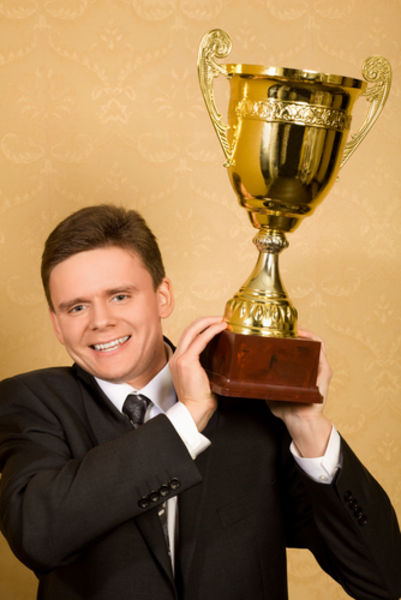
One indicator of the growing recognition of management as a field of great importance has been the proliferation in the late twentieth century of prizes that various governments award their most outstanding organizations. Such official recognition of management practice, quality, and contribution to business reflects the belief at the highest levels that good management practice can be learned and nurtured through promoting awareness of best practices and innovative techniques.
THE FIVE MAJOR AWARDS
The five most prestigious management awards are Japan's Deming Prizes, the United States' Malcolm Baldrige National Award, the European Quality Awards, the Canada Awards for Excellence, and the AKAO Prize.
The first widely esteemed management award, Japan's Deming Prize, was only established in 1950. For nearly three decades, the Deming Prize stood essentially alone as a major prize for business management practice.
With the enormous success of Japanese industry in the late twentieth century, interest in Japanese business practices grew, including Japan's recognition of business successes. By the 1980s, Japan's successes in competing worldwide were admired worldwide and Japanese business began to find emulators. Subsequently, the United States and Europe set up their own equivalents to the Deming Prize to honor their own businesses. The United States established the Malcolm Baldrige National Quality Award in 1989, and soon after the 12 nations of the European Community (now the European Union) jointly created the European Quality Awards in 1990, awarding the first recipient in 1992.
To date, only one company—Xerox—has won all three major quality awards. Xerox was one of the first non-Japanese companies to win the Deming Application Prize (in 1980). Xerox then won the Baldrige Award in 1989, and (in the first year the prize was given out) a European Quality Award in 1992.
THE DEMING PRIZE.
The Japanese Union of Scientists and Engineers (JUSE) created the first major management award, the Deming Prize, to recognize "contributions to quality and dependability of product." The award is still generally held as the most prestigious of all management awards, and is generally recognized as the most highly esteemed business award offered in Japan. The JUSE instituted the award in 1950, and began awarding the prize annually in 1951.
Interestingly, this most significant of Japan's business awards honors an American, Dr. W. Edwards Deming. Many Japanese government and academic leaders credit Deming with revolutionizing Japanese postwar industry through his advocacy in Japan of quality control and managerial efficiency.
The JUSE's Deming Prize Committee administers two types of awards honoring Deming: the Deming Prize and the Deming Application Prize. The Deming Prize is given to a person or group of people who have advanced the practice and furthered awareness of TQC. The Deming Application Prize, in turn, goes only to companies based on successes attributable to implementing TQC.
Beginning in 1970, the JUSE began to offer the Japan Quality Control Medal. Only those who have formerly won a Deming Application Prize five years or more earlier are eligible for the Quality Control Medal. The medal is intended to upgrade the quality control of former prize recipients. To this end, the criteria for the Quality Control Medal remain the same as the Deming Application Prize and the Medal is awarded at the same time as the other Deming Prize awards. The current aim of the examination is to find out how well a company implements total quality control by assessing its quality-assurance policies and activities, and by measuring the company's results in the areas of productivity improvement, quality improvement, cost reduction, expanded sales, and increased profits.
Non-Japanese companies were allowed to apply for and receive the Deming Prize starting in 1984; the categories that remain unavailable to non-Japanese companies include the individual prize and the factory award.
MALCOLM BALDRIGE NATIONAL QUALITY AWARD.
The U.S. Congress created the Malcolm Baldrige National Quality Award in 1987 largely as a counterpart to Japan's Deming Prize. The specific goal of the Baldrige Award is to heighten U.S. awareness of TQM and to formally recognize successful quality management systems. The award is named for the U.S. Secretary of Commerce from 1981 to 1987. Baldrige was actually helping in drafting the creation of the award at the time of his death in a rodeo accident.
The U.S. Commerce Department's National Institute of Standards and Technology (NIST) administers the Baldrige Award. The NIST presents up to two awards each in three divisions: manufacturing, service, and small business. The NIST gave its first awards in 1988.
The Baldrige Award judges results companies have shown through management practices in seven specific areas. These are (1) leadership, (2) information and analysis, (3) strategic planning, (4) human resource focus, (5) process management, (6) business results and company performance, and (7) customer focus and satisfaction.
The Baldrige Award is open to any for-profit business in the United States. Like the Deming Prize, the award may be won by a foreign-owned company, but unlike the Deming Prize only those foreign-owned companies with more than 50 percent of their employees or physical assets located in the United States are eligible.
In addition to its more parochial focus, the Baldrige differs from the Deming Prize in three significant ways. First, the Baldrige Award emphasizes customer perceptions and the bottom line emphasizing clear-cut results through its seven specific areas. This makes the Baldrige more objective-oriented than the more systemic focus of the Deming Prize.
Second, while the NIST is an independent agency, the Baldrige relies on a wide array of professional groups to decide on its winners, while from its inception the Deming Prize has relied solely on the JUSE. The Baldrige is consequently able to draw on a wider range of expertise among its judges than the Deming Prize, but may be more open to charges of conflict of interest among the reviewers.
Finally, the Baldrige Award has a stated objective of sharing information while the Deming Prize does not. Consequently, the Baldrige is more likely to make known to other companies how the winners have achieved their success so that others may emulate them; the Deming Prize is more proprietary, allowing winners more readily to keep company secrets if they wish, thus widening the field of companies which may wish to participate but simultaneously limiting the benefit to other companies and to the dissemination of TQM principles in general.
THE EUROPEAN QUALITY AWARDS.
By 1990, the European Community (now the European Union) felt that it had fallen behind Japan and the United States in the recognition of quality management. In that year, the European Foundation for Quality Management, with support from the European Organization for Quality and the European Commission, set about to create its own Deming or Baldrige equivalent, The European Quality Awards. The first winners were announced in October 1992.
The initial awards favored larger, for-profit companies, so by 1996 the European Commission began to give out additional awards for public sector organizations and for small- to mid-sized enterprises. The awards also have a category for operational units of companies, such as factories, research units, or assembly plants.
The European Quality Awards, regardless of category, judges applicants on nine criteria: (1) leadership; (2) people management; (3) policy and strategy,
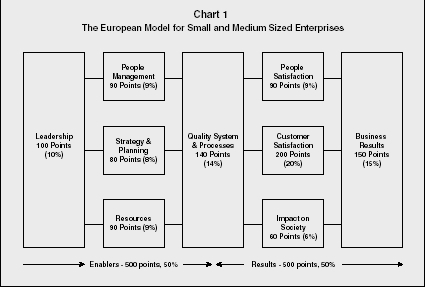
The European Model for Small and Medium Sized Enterprises
While the categories essentially copy those of the Baldrige Award, the emphasis on people's perceptions of the organization and of the organization's impact on society are unique to the European Quality Awards and add a societal element lacking in either the Deming or Baldrige Awards. The European Quality Awards also differ from the Deming and Baldrige, as noted earlier, in the various categories for eligible organizations. The European Quality Awards also differ in the nature of their awards jury, which is made up of business leaders as well as academics. Finally, by its nature, the European Union is more international than either Japan or the United States, and from the start, the award has been open to companies outside the European Union. Still, the award is limited to those companies that have at least 50 percent of their activities in Europe.
Applications to the program are examined by a team of six assessors, each of whom undergo training to ensure a high level of consistency in scoring. Assessors include some academics and quality professionals, but the majority are drawn from the ranks of experienced practicing managers from European countries. The application is assessed and scored on a scale from 0 to 1,000 points. Chart 1 illustrates the scoring system for the small- and medium-sized company award.
THE CANADA AWARDS FOR EXCELLENCE.
After Japan established the Deming Prize, Canada was the next major industrialized nation to establish an award honoring managerial practice. Even then, it was not until 1983 that the federal government of Canada created the Canada Awards for Excellence. For the first ten years, the Canada Awards for Excellence were administered by the Canadian government directly. In 1993, Canada handed the administration of the award over to the National Quality Institute, a Canadian non-profit organization.
From the beginning, the Canada Awards for Excellence differed from the Deming Prizes in significant ways that in some respects laid the foundation of the Baldrige and European Quality Awards. The Canada Awards for Excellence were from their inception more results-oriented than the Deming Prize and in this respect served as a blueprint for the Baldrige Award's results orientation. Indeed, the Canada Awards for Excellence have been judging nominees on their "Seven Drivers" as the criteria for excellence six years before the first Baldrige Award was given for its seven factors. Indeed, most of the Canadian Awards' Seven Drivers are the same as what the Baldrige Award would later adopt. The Canadian Seven Drivers are (1) leadership, (2) planning, (3) customer focus, (4) people focus, (5) process management, (6) supplier focus, and (7) organizational performance.
Similarly, the Canada Awards for Excellence foreshadowed the broader reach of the European Quality Awards. From their beginning, the Canadian
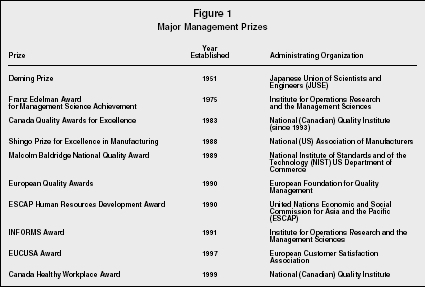
Major Management Prizes
In many respects, the Canada Awards for Excellence are as significant as their better known counterparts in Japan, the United States, and Europe, but remain more limited in scope simply because of Canada's relatively small population. Still, the Canada Awards for Excellence are highly regarded within Canada itself, and since their founding over 300 people and organizations have received the award.
Until 1999, Canada offered only one Award for Excellence: the Quality Award. Beginning in 1999, Canada broke new ground by offering a second award previously unprecedented elsewhere in national awards, the Healthy Workplace Award. The Healthy Workplace Award recognizes organizations that "promote, encourage, support and offer exemplary health-related programs in the workplace," judging the organization in five areas: (1) leadership, (2) planning, (3) people focus, (4) process management, and (5) outcomes.
AKAO PRIZE.
In 1996, the QFD Institute established the Akao Prize to recognize individuals who have made an "outstanding contribution to the advancement of QFD." The award roughly follows the pattern of the Deming award but differs from other quality awards not only in focusing exclusively on QFD, but in recognizing only individuals, and not organizations as a whole. The prize was named for Dr. Yoji Akao, himself a Deming Award winner and one of the seminal developers of the field of QFD. Dr. Akao personally hands out the award at the annual ceremony.
OTHER QUALITY AWARDS
The success of the major awards in attracting attention to management excellence in Japan, the United States, the European nations and Canada has promoted widespread interest in other nations as well as state awards within the United States, provincial awards within Canada, and individual national awards within Europe (as shown in Figure 1).
AUSTRALIA.
Australia established its Australian Quality Awards for Business Excellence in 1991. The award is somewhat unique in that it has four tiers of recognition, nurturing companies to maintain ongoing quality management excellence. The first tier is the Business Improvement Level, giving first-level recognition for Progress or Foundation in Business Excellence. The next level, The Australian Quality Award for Business Excellence, is a best practices achievement award. The third level is the Australian Quality for Business Excellence Gold Award, open only to past award winners and intended to demonstrate ongoing improvement. The highest level is the
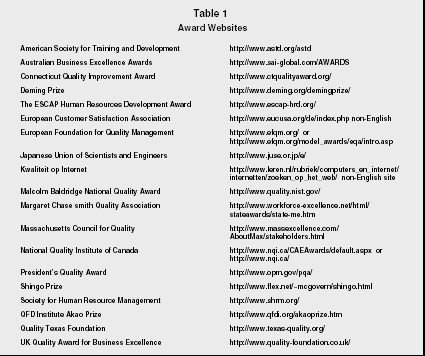
Award Websites
| American Society for Training and Development | http://www.astd.org/astd |
| Australian Business Excellence Awards | http://www.sai-global.com/AWARDS |
| Connecticut Quality Improvement Award | http://www.ctqualityaward.org/ |
| Deming Prize | http://www.deming.org/demingprize/ |
| The ESCAP Human Resources Development Award | http://www.escap-hrd.org/ |
| European Customer Satisfaction Association | http://www.eucusa.org/de/index.phpnon-English |
| European Foundation for Quality Management |
http://www.efqm.org/
or
http://www.efqm.org/model_awards/eqa/intro.asp |
| Japanese Union of Scientists and Engineers | http://www.juse.or.jp/e/ |
| Kwaliteit op Internet | http://www.leren.nl/rubriek/computers_en_internet/internetten/zoeken_op_het_web/non-English site |
| Malcolm Baldridge National Quality Award | http://www.quality.nist.gov/ |
| Margaret Chase smith Quality Association |
http://www.workforce-excellence.net/html/
|
| Massachusetts Council for Quality |
http://www.massexcellence.com/
|
| National Quality Institute of Canada |
http://www.nqi.ca/CAEAwards/default.aspx
or
http://www.nqi.ca/ |
| President's Quality Award | http://www.opm.gov/pqa/ |
| Shingo Prize | http://www.flex.net/~mcgovern/shingo.html |
| Society for Human Resource Management | http://www.shrm.org/ |
| QFD Institute Akao Prize | http://www.qfdi.org/akaoprize.htm |
| Quality Texas Foundation | http://www.texas-quality.org/ |
| UK Quality Award for Business Excellence | http://www.quality-foundation.co.uk/ |
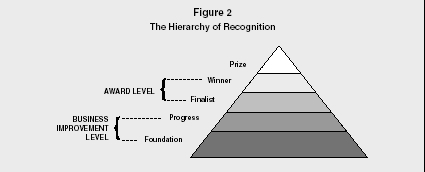
The Hierarchy of Recognition
Australian Quality Prize, also open only to former winners and represents best practices internationally throughout the company.
At the awards, organizations can receive kudos via recognition either as a finalist or a winner. Figure 2 depicts the hierarchy of recognition. Winners gain the right to use the Australian Quality Awards for Business Excellence logo for three years.
NEW ZEALAND.
The New Zealand Quality Foundation established the New Zealand Excellence Award in the late 1990s. Like its Australian counterpart, it is a tiered award, although with three rather than four tiers.
EUROPE.
Several European countries have national prizes honoring business excellence and quality management in their nation. Among these are Denmark's Den Danske Kvalitets Pris (the Finnish Quality Award), the Dutch Nederlandse Kwaliteitprijs (Netherlands Quality Award), Ireland's Business Excellence Award, and Switzerland's Esprix award, also known as the Schweizer Qualitätspreis für Business Excellence (Swiss Quality Award for Business Excellence). The United Kingdom Quality Award for Business Excellence, established in 1994 by the president of the U.K. Board of Trade, was extended beyond for-profit organizations in 1995 to include categories not only for public organizations but, somewhat uniquely, also for voluntary services.
Even some regions within European nations (for example, Northern Ireland within the United Kingdom, and Flanders within Belgium) have begun to offer their own quality management prizes. Most of these competitions use the same guidelines as those used in the European Quality Awards.
UNITED STATES.
Soon after the introduction of the Baldrige awards, a majority of the states began to offer their own awards. The oldest of these was the Connecticut Quality Improvement Award, begun in 1987, and so actually preceding the Baldrige Award by a year. Yet within ten years, Connecticut was just one of 41 states offering their own awards for excellence, most based at least in part on the Baldrige Award criteria. Several of these awards modified the Baldrige qualifications to include government, educational, or nonprofit organizations. Several awards from the larger states such as the Texas Quality Award and California's Eureka Award for Quality have tiered levels similar to the Australian Quality Awards described above.
Also notable is the Massachusetts Quality Award, established in 1992. The Massachusetts award is named for Armand Feigenbaum, the Massachusetts native whose book Total Quality Control (1951) founded the TQM movement. Most of the state awards are at least partially and usually entirely government funded. Maine's Margaret Chase Smith Maine State Quality Award, however, is unique in that it is entirely privately funded, which its organizers argue makes it freer from political considerations.
In addition to state-sponsored awards, several federal departments offer quality awards. For example, the U.S. Department of Energy Quality Accomplishment Award, begun in 1995, uses the Baldrige Award as its guidelines. The DOE Quality Accomplishment Award is administered by the Department of Commerce (and so independent of the DOE itself).
Similarly, the federal Office of Personnel Management annually offers the President's Award for Quality. The OPM's President's Award also uses the Baldrige Award criteria. The award recognizes federal agencies that have successfully implemented total quality management programs.
CANADA.
In addition to the national Canada Awards for Excellence, the provinces of Manitoba and British Columbia offer their own awards. Additionally, Ontario's Durham region also offers its own award.
OTHER COUNTRIES
The Singapore Productivity and Standards Board in 1994 began the Singapore Quality Award to recognize organizations in Singapore for outstanding quality management practices and to enhance Singapore's competitiveness in the global market. Its model uses seven categories for comparing best practices and performances.
In 1995 the Japan Productivity Center for Socio-Economic Development established the Japan Quality Award to be awarded to companies excelling through strong customer focus, competitiveness, employee orientation and social responsibility.
The Costa Rica Excellence Award, a joint effort of the Costa Rican Chamber of Industries and Baxter, Firestone, and Intel, evaluates companies the parameters of ISO 9000 and ISO 14000 standards.
The South African Excellence Award focuses on companies attaining customer satisfaction and is awarded by the South African Excellence Foundation.
The Jordan's King Abdullah II Award for Excellence is the highest level recognition for companies in Jordan. It is aimed at increasing competitiveness by promoting quality awareness, performance and achievement.
AWARDS FOR OTHER
MANAGEMENT AREAS
Many awards exist for other areas besides quality management. These awards range from teamwork issues to customer satisfaction and from manufacturing excellence to operations research management.
AQP NATIONAL TEAM EXCELLENCE AWARD.
The Association for Quality and Participation annually awards teams within organizations for improving quality through participative teamwork for problem-solving, innovation, or improvement of an existing product, service, or process. The focus of the award is primarily for the United States.
THE INFORMS PRIZE.
Since 1991, The Institute for Operations Research and the Management Sciences (INFORMS) has annually awarded their INFORMS Prize to a selected organization for pioneering efforts in the innovation of operations research/management sciences. In 1994, the award took its present name; from 1991 to 1994 the prize had been known as the ORSA Prize.
FRANZ EDELMAN AWARD.
In addition to the INFORMS Prize, the Institute for Operations Research and the Management Sciences has since 1975 annually given out the Franz Edelman Award for Management Science Achievement to reward "outstanding examples of management science and operations research practice in the world." Though several Edelman Awards are given each year, the first-place prize carries a substantial $10,000 purse.
FRANK P. RAMSEY MEDAL.
The Decision Analysis Society awards the Frank P. Ramsey Medal annually to recognize major contributions to the field of decision analysis. The medal is the most recognized decision analysis award, and takes its name from the Cambridge University probability expert who helped found the field.
SHINGO PRIZE.
In 1988, the National Association of Manufacturers established the Shingo Prize for Excellence in Manufacturing. The Shingo Prize is administered by the NAM through the Utah State University College of Business, but is not linked substantively to the state of Utah. Also, while the prize has traditionally been awarded to U.S. companies, it is open to Canadian and Mexican manufacturers as well. The prize honors manufacturers for excellence in productivity and process improvement, quality enhancement, and customer satisfaction. The Shingo Prize rewards "focused improvements in core manufacturing processes, implementing lean, just-in-time philosophies and systems, eliminating waste, and achieving zero defects, while continuously improving products and costs."
EUCUSA AWARD.
The European Customer Satisfaction Association (EUCUSA) began in 1997 to give awards annually to recognize European organizations and companies for achievements in improving customer satisfaction. The award categories are for large and small enterprises, nonprofit organizations, and cities or communities.
ISHIKAWA PRIZE.
The Ishikawa Prize has been awarded annually since 1970 to recognize companies that have applied new methods or systems of management. The award is given by the same organization that gives the Deming Prize, the JUSE. Ichiro Ishikawa, for whom the award is named, was the first chairman of the JUSE's Board of Directors.
ESCAP AWARD.
The United Nations Economic and Social Commission for Asia and the Pacific (ESCAP) in accordance with the Jakarta Plan of Action on Human Resources Development created the ESCAP Human Resources Development Award in 1990. The award is open to organizations in over 50 Asian or Pacific Island nations or territories belonging to the United Nations. The award annually recognizes exceptional work in the field of human resources development (HRD). In addition to the annual honoring ceremony in Bangkok, the winner receives $30,000 for the continuance of their project.
The ESCAP HRD Award has a theme each year. Some years the theme is less closely related to business initiatives than in others. For example, the theme in 1990 emphasized environmental management; the theme in 1992, drug abuse management; and the theme in 1998, education. Still, in most years, the award has recognized HRD for business initiatives. For example, the theme in 1994 was for "Human Resource Development for Women in Extreme Poverty," which was won by the Dhaka Ahsania Mission of Bangladesh. Similarly, the theme in 1995 had a primarily business focus, "HRD for Productive Employment of Youth," and was won by the "Barefoot College" of India's Social Work and Research Centre. In 1996 the theme was "People's Participation in Community Development," won by the Sungi Development Foundation of Pakistan; and in 1997, the theme was "Empowering the Urban Poor," won by Thailand's Human Development Centre.
SHRM AWARDS FOR PROFESSIONAL EXCELLENCE.
The Society for Human Resource Management annually gives out four Awards for Professional Excellence. The four categories are for educators and for large, medium, and small organizations.
ASTD AWARDS.
The American Society for Training and Development offers several awards in three different categories annually. The three categories are (1) Advancing Workplace Learning and Performance; (2) Excellence in Practice; and (3) Advancing ASTD's Vision.
The Advancing Workplace Learning and Performance Awards category includes awards for Distinguished Contribution, for Lifetime Achievement, for Champion of Workplace Learning and Performance, for Research, for Dissertation, and for Public Policy. Recipients have been of very high caliber, including in 1997 alone such figures as management authors Peter Senge and Peter Drucker, General Electric CEO Jack Welch, Senator Patrick Moynihan (New York), Senator William Roth (Delaware), Congressman Clay Shaw (Florida), and Congressman Sander Levin (Michigan).
The Excellence in Practice Awards category covers contributions in applied training in development in different areas including learning technologies, performance improvement, managing change, valuing differences, career development, organizational learning and technical training. The Vision Awards category covers contributions to the ASTD as an organization.
SEE ALSO: Quality and Total Quality Management ; Quality Gurus
David A. Victor and
James C. Koch
Revised by Judith M. Nixon
FURTHER READING:
Brown, M. G. Baldrige Award Winning Quality: How to Interpret the Baldrige Criteria for Performance Excellence. 13th ed. Portland, OR: Productivity Press Inc, 2004.
Funk, V. "Quality Awards Listing." Quality Progress 37, no. 8 (2004): 54–58.
Gabor, A. The Man Who Discovered Quality: How W. Edwards Deming Brought the Quality Revolution to America: The Stories of Ford, Xerox, and GM. New York: Times Books, 1990.
Hui, K.H., and T.K. Chuan. "Nine Approaches to Organizational Excellence." Journal of Organizational Excellence 22, no. 1 (2002): 53–65
Khoo, H.H., and K.C. Tan. "Managing for Quality in the USA and Japan: Differences between the MBNQA, DP and JQA." TQM Magazine 15, no. 1 (2003): 14–24.
Stading, G.L., and R.J. Vokurka. "Building Quality Strategy Content Using the Process from National and International Quality Awards." TQM & Business Excellence 14, no. 8 (2003): 931–946.
Tan, K.C. et al. "Factors Affecting the Development of National Quality Awards." Business Excellence 7, no. 3 (2003): 37–45.
Vukurka, R.J. "A Comparative Analysis of National and Regional Quality Awards." Quality Progress 33, no. 8 (2000): 41–49.
Comment about this article, ask questions, or add new information about this topic: